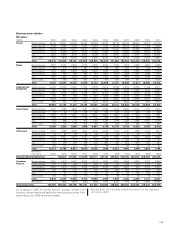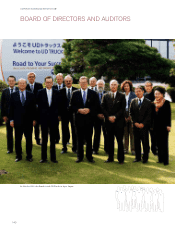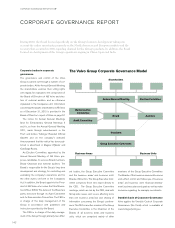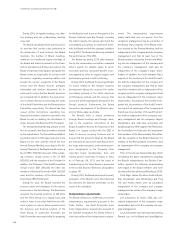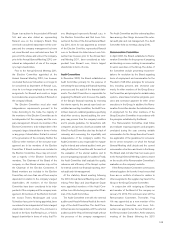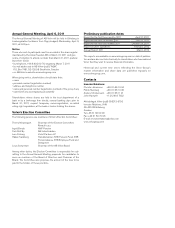Volvo 2010 Annual Report Download - page 149
Download and view the complete annual report
Please find page 149 of the 2010 Volvo annual report below. You can navigate through the pages in the report by either clicking on the pages listed below, or by using the keyword search tool below to find specific information within the annual report.Duzan is an advisor to the president of Renault
S.A. and was also stated as representing
Renault s.a.s. on the company’s Board. They
were both considered independent of the com-
pany and the company management but were
not, since Renault s.a.s. controled more than 10
percent of the shares and votes in the company,
prior to the Annual General Meeting 2010, con-
sidered as independent of one of the compa-
ny’s major shareholders.
Prior to the Annual General Meeting 2011,
the Election Committee appointed at the
Annual General Meeting 2010, has however
concluded that Louis Schweitzer is no longer to
be considered as dependent of Renault s.a.s.,
since he is no longer employed by nor has any
assignments for Renault and could no longer
be considered as a representative of Renault on
the company’s Board.
The Election Committee must also meet
independence requirements pursuant to the
Code. According to the Code, the majority of
the members of the Election Committee are to
be independent of the company and the com-
pany management. At least one member of the
Election Committee is to be independent of the
company’s largest shareholder in terms of votes
or any group of shareholders that act in concert
in the governance of the company. Neither the
CEO nor other members of the executive man-
agement are to be members of the Election
Committee. If Board members are included in
the Election Committee, these may not consti-
tute a majority of the Election Committee’s
members. The Chairman of the Board of the
company or other Board member may not be
the Chairman of the Election Committee. If
Board members are included in the Election
Committee, not more than one of them may be
dependent in relation to the company’s largest
shareholders. All members of the Election
Committee have been considered to be inde-
pendent of the company and the company man-
agement. All members of the Election Commit-
tee except Thierry Moulonguet and Louis
Schweitzer have, prior to being appointed, been
considered to be independent of Volvo’s largest
shareholder in terms of votes. This conclusion is
based on the facts that Renault s.a.s. is Volvo’s
largest shareholder in terms of votes, that Thi-
erry Moulonguet represents Renault s.a.s. in
the Election Committee and that Louis Sch-
weitzer at the time of the Annual General Meet-
ing 2010, when he was appointed as member
of the Election Comittee, represented Renault
s.a.s. in the Board. As stated above Louis Sch-
weitzer has however, prior to the Annual Gen-
eral Meeting 2011, been considered as inde-
pendant from Renault s.a.s., Volvo’s largest
shareholder in terms of votes.
Audit Committee
In December 2002, the Board established an
Audit Committee primarily for the purpose of
overseeing the accounting and financial reporting
processes and the audit of the financial state-
ments. The Audit Committee is responsible for
preparing the Board’s work to assure the quality
of the Group’s financial reporting by reviewing
the interim reports, the annual report and con-
solidated accounting. In addition, the Audit Com-
mittee’s task is to establish guidelines specifying
what other services, beyond auditing, the com-
pany may procure from the company’s auditors
and to provide guidelines for transactions with
companies and persons closely associated with
Volvo.The Audit Committee also has the task of
reviewing and overseeing the impartiality and
independence of the company’s auditor. The
Audit Committee is also responsible for evaluat-
ing the internal and external auditors’ work, pro-
viding the Election Committee with the results of
the evaluation of the eternal auditors and to
assist in preparing proposals for auditors. Finally,
the Audit Committee shall evaluate the quality,
relevance and efficiency of the Group’s system
for internal control over financial reporting, inter-
nal audit and risk management.
At the statutory Board meeting following
the 2010 Annual General Meeting, Lars West-
erberg, Peter Bijur and Jean-Baptiste Duzan
were appointed members of the Audit Com-
mittee. Lars Westerberg was appointed Chair-
man of the Audit Committee.
The Audit Committee met with the external
auditors and Head of Internal Audit at the meet-
ings of the Audit Committee. The Audit Com-
mittee has also met separately with the external
auditors and the Head of Internal Audit without
the presence of the company management.
The Audit Committee and the external auditors
have among other things discussed the exter-
nal audit plan and risk management. The Audit
Committee held six meetings during 2010.
Remuneration Committee
In April 2003, the Board established a Remu-
neration Committee for the purpose of preparing
and deciding on issues relating to remuneration
to senior executives in the Group. The duties of
the Committee include presenting recommen-
dations for resolution by the Board regarding
terms of employment and remuneration for the
President of AB Volvo, principles for remunera-
tion, including pensions and severance pay-
ments, for other members of the Group Execu-
tive Committee, and principles for variable salary
systems, share-based incentive programs, pen-
sions and severance payment for other senior
executives in the Group. In addition, the Remu-
neration Committee decides the individual terms
of employment for the other members of the
Group Executive Committee in accordance with
the principles established by the Board.
The Remuneration Committee shall follow
and evaluate ongoing programs and programs
concluded during the year covering variable
remuneration for the Group Executive Commit-
tee, application of the guidelines for remunera-
tion to senior executives on which the Annual
General Meeting shall decide and the current
remuneration structures and levels in the Group.
The Board shall, not later than two weeks prior
to the Annual General Meeting, submit a report
on the results of the Remuneration Committee’s
evaluation on the company’s website.
If the Remuneration Committee commissions
external suppliers for its work, it must ensure that
there are no conflicts of interest in relation to
other assignments this supplier may have for the
Group or the Group Executive Committee.
In conjunction with resigning as Chairman
and member of the Board of the company on
January 15, 2010, Finn Johnsson also left the
Remuneration Committee. Thereafter, Ying
Yeh was appointed as a new member of the
Remuneration Committee and Louis Sch-
weitzer was appointed as the new Chairman of
the Remuneration Committee. At the statutory
meeting of the Board following the 2010
145


